
Can Dogs Eat Cheese? Safe Options and Feeding Tips for Owners
Overview
Have you ever worried about your dog's health when it comes to their diet? Many dog owners wonder if it's safe to share certain human foods, like cheese, with their furry friends. The good news is that dogs can eat cheese in moderation. It can provide beneficial nutrients such as protein and calcium, which are essential for their health.
However, it's important to approach this treat with care. Some dogs may experience lactose intolerance, and cheese can also be high in fat. Therefore, it's crucial to choose safe cheese options and monitor your dog for any adverse reactions. In addition, consulting your veterinarian can help ensure that cheese is a healthy addition to your dog's diet.
By being mindful of these factors, you can enjoy sharing this tasty treat with your dog while keeping their health in cheque. Remember, your veterinarian can provide personalised advice tailored to your dog's specific needs. Taking these steps will help you feel more confident in making dietary choices for your beloved pet.
Introduction
Cheese often brings to mind images of happy pets enjoying a tasty treat. Have you ever worried about your dog's health in relation to this dairy delight? While cheese can provide valuable nutrients like protein and calcium, the question of whether dogs can safely indulge is more nuanced than it seems. It's essential to understand that, for some dogs, especially those who are lactose-intolerant, cheese may pose risks.
As loving pet owners, navigating the joys and pitfalls of incorporating cheese into your furry companion's diet can be challenging. You might find yourself weighing the benefits against potential health issues. Moreover, it’s crucial to consider what safe options exist. How can you ensure that cheese remains a healthy addition rather than a harmful indulgence?
In addition to the nutritional benefits, there are ways to introduce cheese into your dog's diet that prioritise their health. By exploring these options, you can create a positive experience for both you and your pet. Remember, your dog's well-being is paramount, and making informed choices will help you both enjoy those delightful moments together.
Understand the Benefits and Risks of Cheese for Dogs
Have you ever worried about your dog's health? Cheese can be a delightful treat for pets, leading to the question: can dogs eat cheese, since it offers numerous benefits when given in moderation. It serves as a rich source of protein, calcium, and essential vitamins A and B12, all of which contribute positively to a dog's overall health. However, it is essential to acknowledge the potential dangers, particularly for dogs that are intolerant to milk. Symptoms of lactose intolerance may manifest as diarrhoea, gas, and stomach upset, typically occurring within 12 hours of consumption.
Moreover, dairy is calorie-rich and high in fat, which can lead to obesity and associated wellness concerns if overindulged. For example, dairy products should not make up more than 10% of a dog's daily caloric intake. Consequently, it is essential for dog owners to thoughtfully evaluate these advantages and drawbacks prior to incorporating dairy into their pet's diet, ensuring that any new food aligns with their dog's specific wellness requirements.
Consulting with a veterinary is always recommended to tailor dietary choices appropriately. Utilising Scooch's user manuals can help dog owners navigate these dietary choices effectively. In addition, safer dairy options for dogs include low-fat cottage variety, mozzarella, and cheddar. It is essential to avoid products that may contain toxic ingredients like xylitol, garlic, onion, and chives.
Incorporating vet-formulated supplements from Scooch, which include beneficial ingredients like Bacillus Coagulans and Zinc, can further support your dog's digestive wellness. By being mindful of these factors, you can determine if can dogs eat cheese safely and healthily for your furry friend.
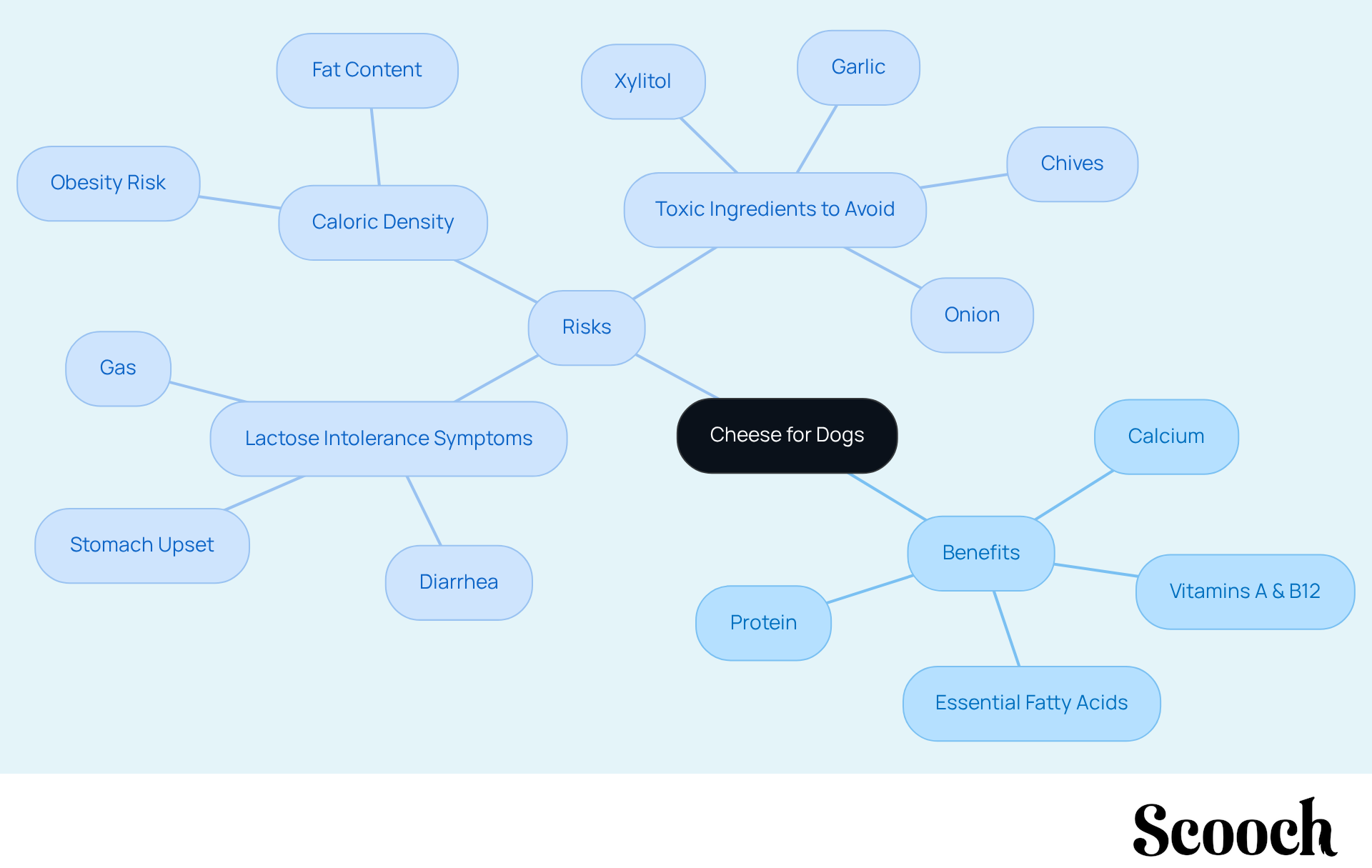
Identify Safe Cheese Options for Dogs
As a dog owner, have you ever worried about your furry friend's health? When it comes to choosing dairy options for your dog, especially regarding the question of can dogs eat cheese, it’s essential to prioritise types that are lower in sugar and fat. This ensures their health and well-being. Here are some safe options:
- Cottage Cheese: Low in fat and high in protein, cottage cheese is a nutritious choice that many dogs tolerate well. Incorporating Scooch's vet-formulated supplements can further enhance your dog's digestion and nutrient balance.
- Mozzarella: With its reduced milk sugar content, mozzarella can be a delightful treat in moderation, but it's worth asking if can dogs eat cheese. Pairing it with Scooch's supplements can support your dog's immune system and energy levels.
- Cheddar: While it has a higher fat content, small amounts of cheddar can be offered as a treat, leading to the question of can dogs eat cheese, especially if your dog enjoys its taste. Remember, Scooch's supplements can help maintain joint support and overall well-being.
- Swiss Varieties: Generally safe for many dogs due to their lower lactose levels, which raises the question of whether can dogs eat cheese as part of their diet. To optimise gut health, consider adding Scooch's prebiotics and probiotics to their routine.
However, it’s crucial to avoid dairy products that are high in fat, such as cream or blue varieties, as these can lead to digestive issues and contribute to obesity. Notably, blue mould dairy contains roquefortine C, a harmful compound for canines, which necessitates careful selection of dairy products. Furthermore, dogs with milk sugar sensitivity or dairy allergies should steer clear of cheese entirely. When deciding if can dogs eat cheese, it should be given as an occasional treat in moderation, considering their size and diet. Always consult with your veterinary surgeon before introducing new foods to your dog's diet, especially if they have a history of lactose intolerance or food allergies.
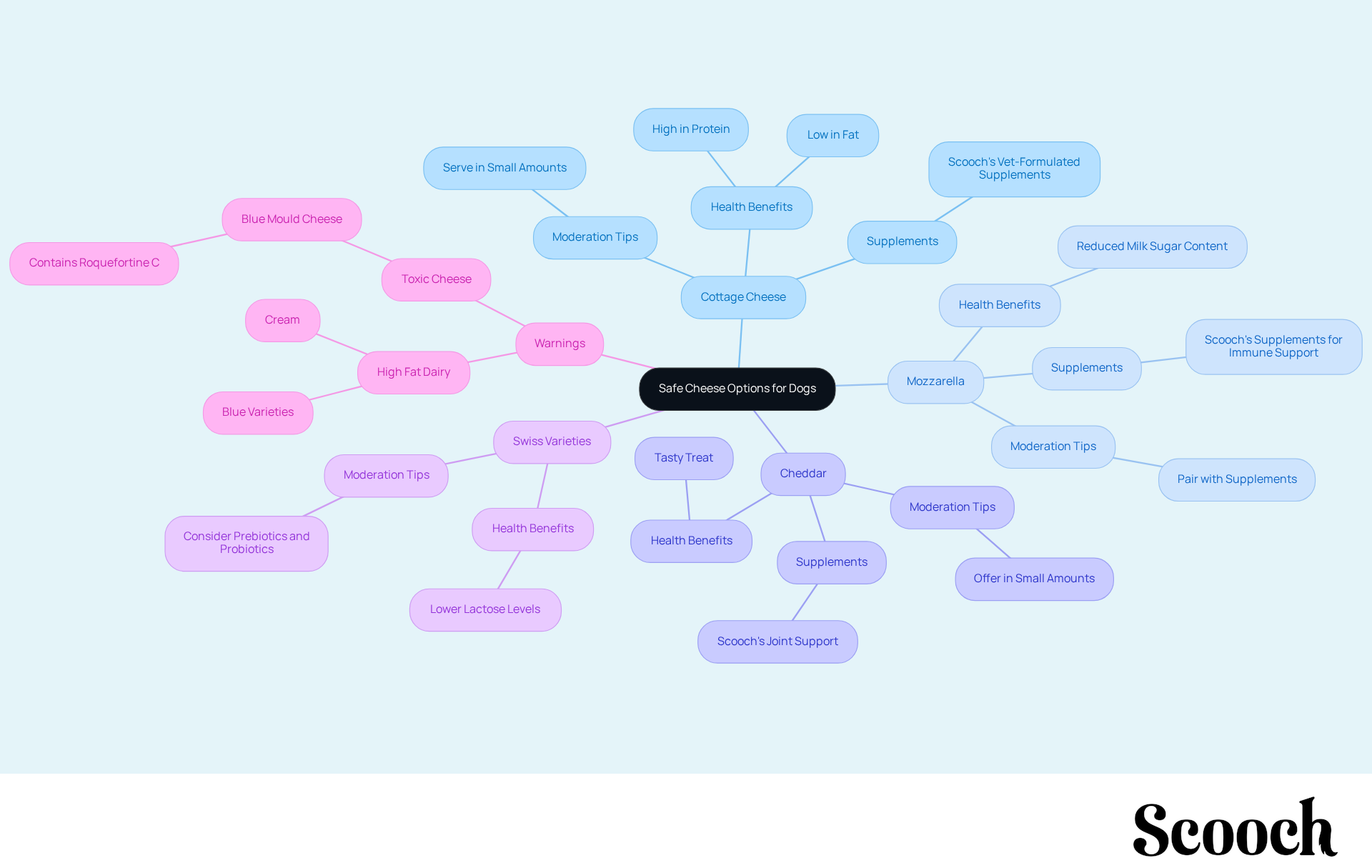
Implement Safe Feeding Practices for Cheese
Have you ever worried about your dog's health when it comes to their diet? Introducing cheese into your dog's meals can feel daunting, but with the right approach, you can explore whether can dogs eat cheese as a delightful addition. To safely incorporate cheese into your dog's diet, consider these thoughtful practices:
-
Start Small: Begin by introducing dairy in small amounts to observe how your dog reacts. A small portion, such as a teaspoon of cottage cheese, is a gentle way to start.
-
When considering if can dogs eat cheese, remember to limit dairy products as an occasional treat rather than a staple in your dog's diet. It's wise to restrict these indulgences to just once or twice a week.
-
Monitor Portions: Keeping portions small is crucial to avoid excessive calorie intake. A helpful guideline is to limit dairy treats to no more than 10% of your dog's daily caloric intake.
-
When training dogs, you might wonder if can dogs eat cheese, as it can serve as a fantastic motivator during training sessions. Use small pieces as rewards for good behaviour, ensuring you adjust their regular food intake accordingly.
By following these simple guidelines, you can confidently enrich your dog's diet while keeping their health in mind. Remember, every dog is unique, so always pay attention to how your furry friend responds to new foods!
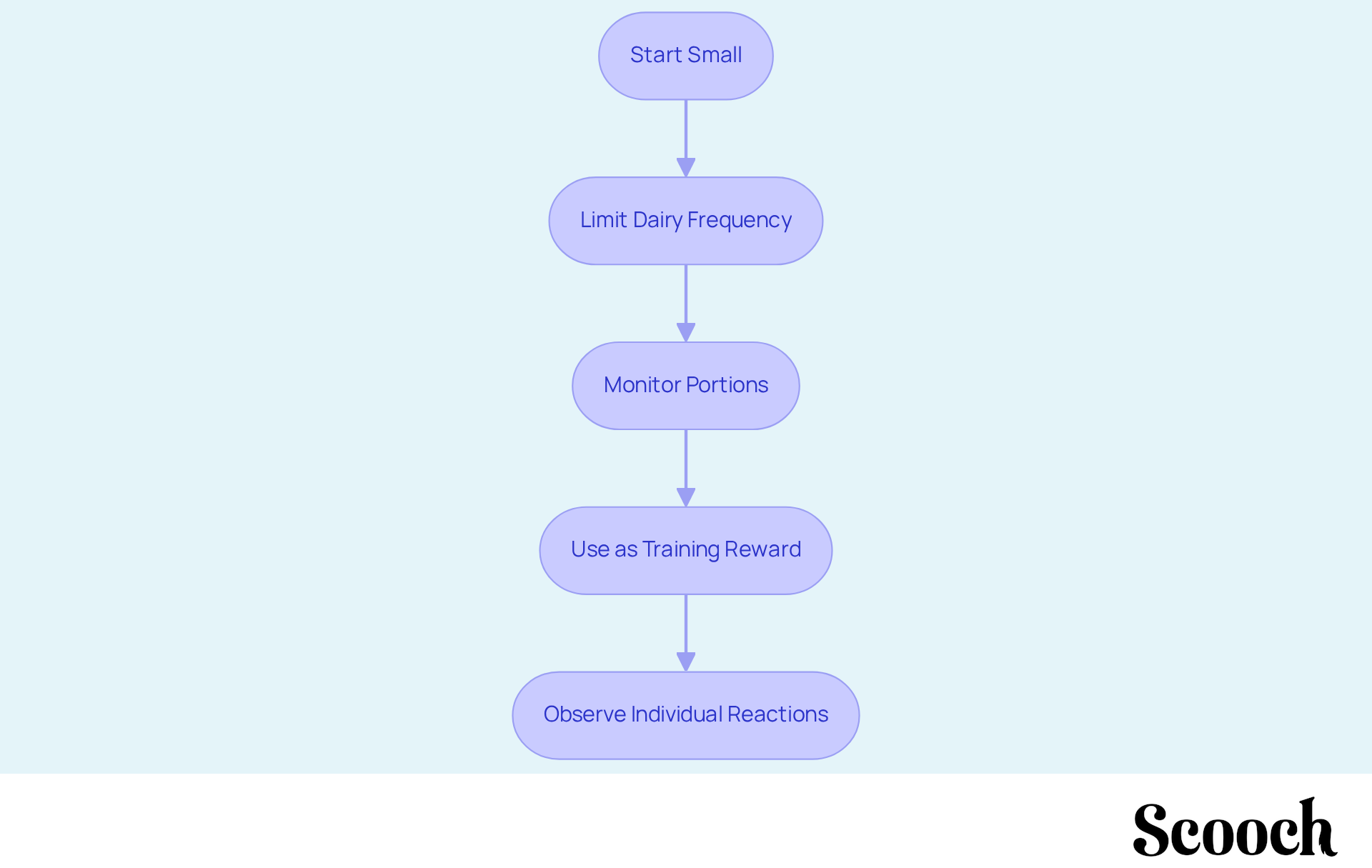
Monitor Your Dog for Adverse Reactions
When incorporating cheese into your pet's diet, have you ever wondered, can dogs eat cheese without worrying about their health? It's essential to observe them carefully for any negative reactions. With the assistance of Scooch's extensive pet health subscription service, which has enhanced the lives of 19,841 canines and counting, you can feel more confident in your choices. Key signs to observe include:
- Gastrointestinal Issues: Symptoms such as diarrhoea, vomiting, or excessive gas may indicate lactose intolerance, which is relatively common in dogs. Many adult canines have a diminished capacity to digest lactose, which leads to discomfort after consuming dairy items, prompting the question of can dogs eat cheese.
- Behavioural Changes: If your dog seems lethargic or shows signs of discomfort after consuming dairy, this could indicate an adverse reaction. Behavioural shifts can often accompany gastrointestinal distress.
- Allergic Reactions: Although rare, some dogs may develop allergies to dairy. Symptoms can manifest as itching, swelling, or hives, indicating a more serious response to dairy. Food allergies can develop at any age, even if a dog has been eating the same food for years, so vigilance is essential.
If you observe any concerning symptoms, it is advisable to stop feeding cheese and consult your veterinary for further guidance on if can dogs eat cheese. Moreover, maintaining a comprehensive food journal can be advantageous in monitoring any alterations in your dog's condition associated with their diet. This can assist in recognising possible triggers and managing their overall well-being. With Scooch's innovative wellness tracking features, you can easily monitor your dog's responses and overall condition. Be aware that severe allergic reactions may require immediate veterinary attention, and monitoring for any side effects from medications is also important. Consider incorporating Scooch's vet-formulated products, such as the All-In-One health supplement, to support your dog's dietary needs.
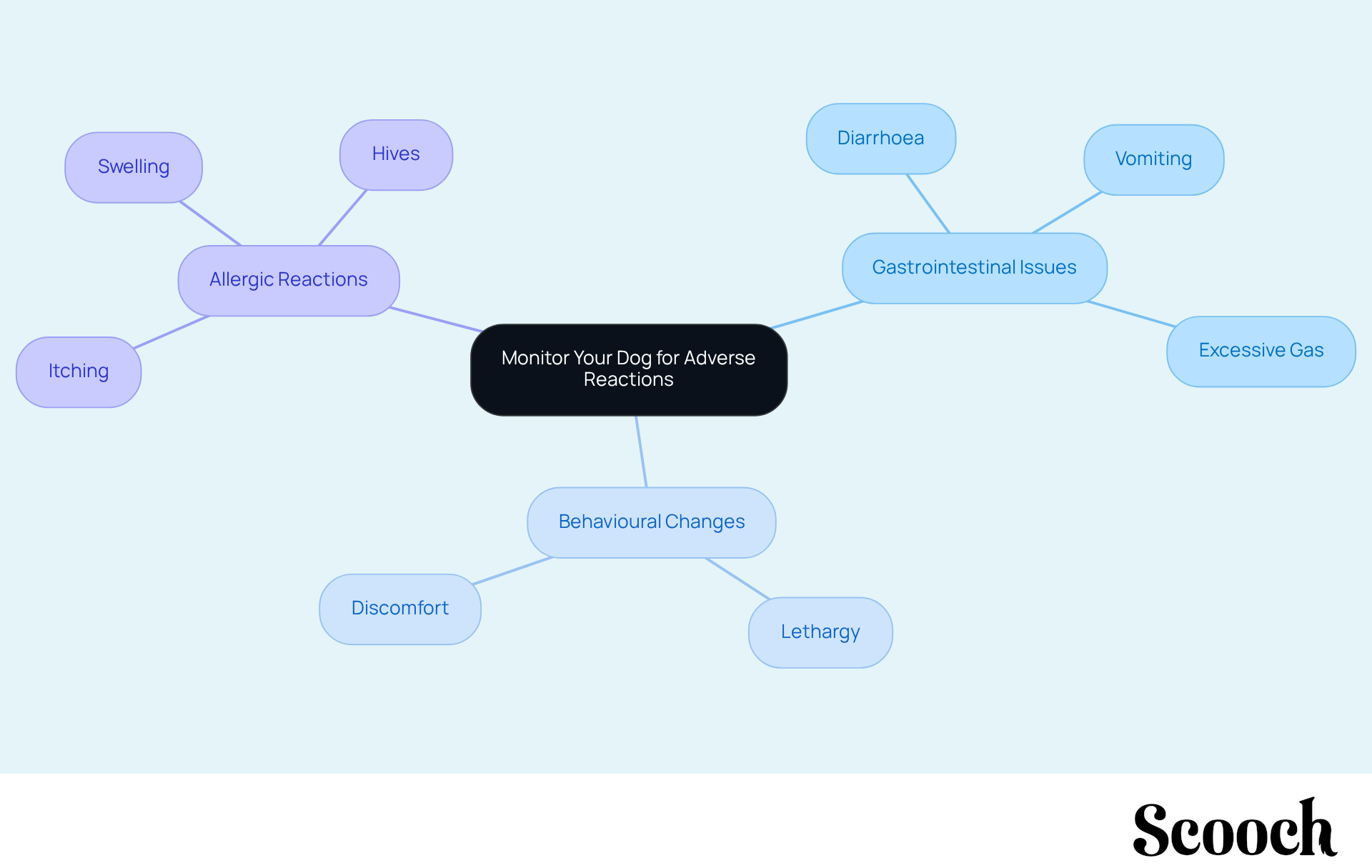
Conclusion
Incorporating cheese into your dog's diet can be a delightful experience, but it’s essential to approach it with caution and awareness. Have you ever worried about your dog's health when trying new treats? Cheese offers beneficial nutrients like protein and essential vitamins, yet it’s crucial to consider potential risks, especially for dogs with lactose intolerance or dietary sensitivities. By understanding these factors, you can make informed decisions about including cheese as a treat in your pet's diet.
Choosing safe cheese options is vital. Consider:
- Cottage cheese
- Mozzarella
- Cheddar
while avoiding high-fat varieties and those with harmful ingredients. Moreover, implementing safe feeding practises—such as starting with small portions and observing for any adverse reactions—is key to ensuring a positive experience. Monitoring your dog's response to cheese can help identify any intolerance or allergies, allowing you to tailor their dietary choices effectively.
Ultimately, the decision to feed cheese to your dog should be made with mindfulness and care. By prioritising their health and consulting with a veterinarian when necessary, you can confidently enhance your furry friend's diet with safe and enjoyable treats. Embracing these practises not only supports your dog's overall well-being but also fosters a deeper bond through shared moments of joy during treat time.
Frequently Asked Questions
Can dogs eat cheese?
Yes, dogs can eat cheese in moderation, as it offers benefits such as protein, calcium, and essential vitamins A and B12.
What are the benefits of cheese for dogs?
Cheese serves as a rich source of protein, calcium, and essential vitamins A and B12, which contribute positively to a dog's overall health.
Are there any risks associated with feeding cheese to dogs?
Yes, the risks include potential lactose intolerance in some dogs, which can lead to symptoms like diarrhoea, gas, and stomach upset. Additionally, cheese is calorie-rich and high in fat, which can contribute to obesity if overindulged.
How much cheese can I safely give my dog?
Dairy products, including cheese, should not make up more than 10% of a dog's daily caloric intake.
What should I consider before giving cheese to my dog?
Dog owners should evaluate the benefits and drawbacks of cheese in relation to their dog's specific wellness requirements and consult with a veterinarian for tailored dietary choices.
What are some safer dairy options for dogs?
Safer dairy options include low-fat cottage cheese, mozzarella, and cheddar.
What ingredients should I avoid in dairy products for dogs?
Avoid dairy products that contain toxic ingredients like xylitol, garlic, onion, and chives.
How can I support my dog's digestive wellness when incorporating cheese?
Incorporating vet-formulated supplements that include beneficial ingredients like Bacillus Coagulans and Zinc can help support your dog's digestive wellness.
List of Sources
- Understand the Benefits and Risks of Cheese for Dogs
- Can Dogs Eat Cheese? Benefits, Risks, and Dog-Safe Alternatives (https://bettyandbutch.co.uk/blogs/news/can-dogs-eat-cheese-benefits-risks-and-dog-safe-alternatives)
- Can My Dog Eat Cheese? The Truth for Pet Owners (https://marleybones.com/blogs/news/food-can-dogs-eat-cheese)
- Is Cheese Safe for Dogs? Benefits and Risks Explained (https://petscare.com/news/faq/is-cheese-good-for-dogs-2)
- Can Dogs Eat Cheese? Benefits, Risks & Safe Choices (https://petscare.com/news/post/feeding-cheese-to-dogs-balancing-benefits-and-risks)
- Can Dogs Eat Cheese? Understanding the Risk (https://homesitters.co.uk/can-dogs-eat-cheese-understanding-the-risk)
- Identify Safe Cheese Options for Dogs
- Can Dogs Eat Brie Cheese? Expert Answers & Safety Tips (https://justanswer.com/dog-health/evzo5-dog-ate-lot-brie-cheese-bad-20-pound.html)
- Can Dogs Eat Cheese? Here's Everything You Need to Know (https://pawlicy.com/blog/can-dogs-eat-cheese)
- Nutritional management of lactose intolerance: the importance of diet and food labelling - PMC (https://pmc.ncbi.nlm.nih.gov/articles/PMC7318541)
- (https://justanswer.com/pet-dog/9e0b9-boxer-ate-port-wine-cheese-may-two-three-table.html)
- Food Allergies In Dogs | Veterinary Skin & Ear (https://veterinaryskinandear.com/food-allergies-in-dogs)
- Implement Safe Feeding Practices for Cheese
- Number of users of dog biscuits, mixers & treats in the United Kingdom 2023| Statista (https://statista.com/statistics/302517/dog-biscuits-mixers-and-treats-usage-frequency-in-the-uk)
- 5.1: Appendix A - Case Studies (https://med.libretexts.org/Bookshelves/Nutrition/Culinary_Medicine_2025e_(Antonopoulos_et_al.)/05:_Appendices/5.01:Appendix_A-_Case_Studies)
- Monitor Your Dog for Adverse Reactions
- Common Dog Food Allergies: Signs, Diagnosis & Treatment (https://becopets.com/blogs/news/dog-food-allergies)
- Food allergies in dogs - Symptoms to look for (https://lilyskitchen.co.uk/blogs/caring-for-your-dog/food-allergies-in-dogs-symptoms-to-look-for)
- Dog Allergy Relief: Expert Advice on the Best Treatments and Prevention Techniques (https://animalsmatter.com/blogs/news/dog-allergy-relief-expert-advice-on-the-best-treatments-and-prevention-techniques)
- Common allergies in dogs | St Clair Vets (https://stclairvet.co.uk/news/common-allergies-in-dogs)
- Dog Food Allergies: Symptoms, Causes, and Effective Treatments (https://thedogdoctors.co.uk/blogs/news/dog-food-allergies-symptoms-causes-and-effective-treatments)
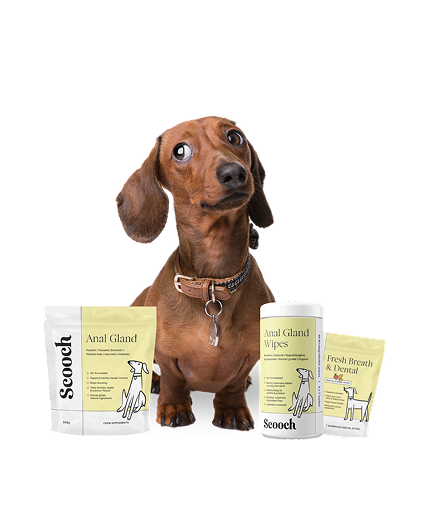
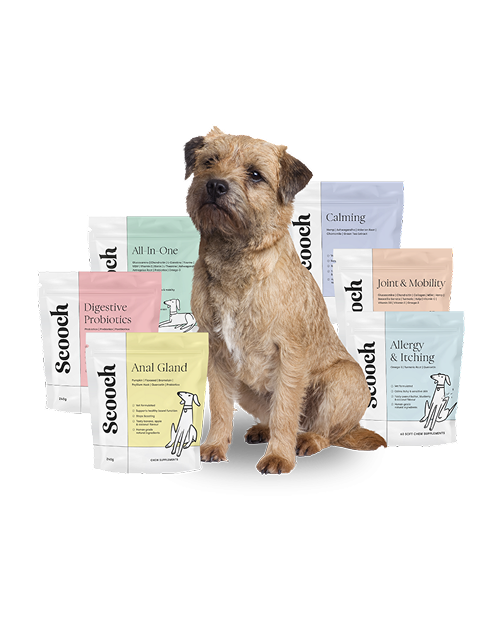
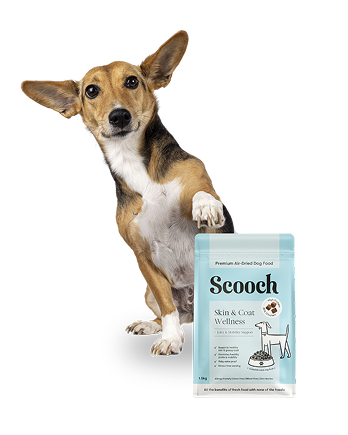
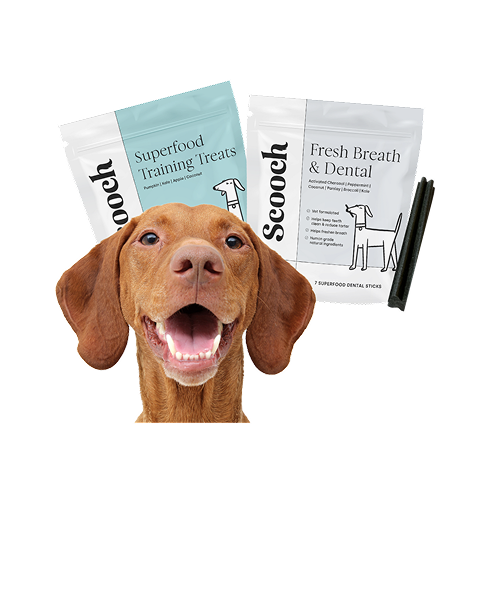
 Scooch health
Scooch health